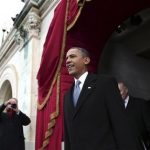JERUSALEM (AP) — With no viable alternative in sight, incumbent Israeli Prime Minister Benjamin Netanyahu appears poised to secure a third term in office following Tuesday’s general election.

Netanyahu wraps up four years of relatively stable reign, in which he boasts of pushing the Iranian nuclear threat to the top of the international agenda, deterring terrorism against Israel and keeping its economy afloat despite a worldwide recession.
But critics point to a stalemate in peace talks with the Palestinians, an expansion of West Bank settlements and a rift with President Barack Obama that have characterized his term. A protest movement against the country’s high cost of living has cut into his public support, and the huge deficit his government has run up promises tough budget cuts following the election.
Even so, the country’s splintered opposition parties and their largely inexperienced leaders have little hope of unseating him.
Together with his three-year term as premier in the late 1990s, Netanyahu, 63, has now served longer than any other Israeli prime minister besides the country’s founding father, David Ben-Gurion.
Yet he has little to show for it on the diplomatic stage. The reason, academics explain, is Netanyahu’s stand-pat approach: He has refrained from taking bold, yet criticized, steps like those of his predecessors – Ehud Barak’s peace offers to Syria and the Palestinians or Ariel Sharon’s unilateral withdrawal from the Gaza Strip.
“He’s succeeded in doing nothing and therefore he can’t be blamed for anything,” said Reuven Hazan, a professor of political science at Jerusalem’s Hebrew University. “The problem is that the status quo doesn’t hold in the Middle East. Things change and time isn’t working in our favor. Something has to be done and this inaction doesn’t help us.”
Since being elected, Netanyahu has sent mixed messages on a variety of fronts. He grudgingly accepted the notion of a Palestinian state in parts of the West Bank, and imposed a partial freeze in settlement building to allow a resumption of peace talks. But he also questioned Palestinian President Mahmoud Abbas’ commitment to peace and angered the world with renewed settlement construction.
It’s part of the mystery of Netanyahu: Is he a pragmatist who plays to his base with hard-line rhetoric or an ideological hard-liner who pays lip service to international opinion?
The answer is unlikely to be found in his next term. Polls show his Likud earning just over a quarter of parliament’s 120-seats, so Netanyahu will likely form a coalition government that could include hard-line and religious parties opposed to territorial concessions.
On the other hand, with a re-elected Obama and an impatient European leadership expected to put more pressure on him, he may be interested in building a moderate coalition.
Either way, his supporters seem drawn to the tough image Netanyahu has cultivated in dealing with world pressure.
“He’s not afraid of Obama. He cares about the people of Israel and represents the Jewish and Zionist interest better than anyone else,” said Shlomo Lipshitz, a 51-year-old religious Jerusalemite.
Gabi Magzimov, 36, said Netanyahu was the strong leader Israel needed to stave off international pressure.
“He provides security and he wants peace, but not at any price,” he said.
The son of a prominent historian, Netanyahu has a keen sense of Jewish history. In his speeches, he often refers to the Jews’ ancient link to the Holy Land and how modern Israel can survive in its hostile region only by never letting down its guard.
Netanyahu followed his older brother Yonatan’s footsteps in the elite Sayeret Matkal military commando unit. Yonatan died in 1976 while commanding a raid that freed Israeli and Jewish hostages from a hijacked plane at Entebbe, Uganda. His death became etched in Israeli lore, catapulting the Netanyahu family into the national spotlight.
Netanyahu, often referred to by his nickname, `Bibi,’ spent part of his youth in the United States, where he acquired his American-accented English, and later completed two degrees at the Massachusetts Institute of Technology, represented Israel as a diplomat in Washington and ambassador at the United Nations.
In Israel, he rocketed up the Likud ranks and beat out several veterans to take over the party after the retirement of Prime Minister Yitzhak Shamir. In 1996, he won a narrow election victory to become Israel’s youngest prime minister at age 46.
His three-year term was marred by political deadlock, internal strife and scandals involving his influential wife, Sara. He was voted out and replaced by Barak. He then dramatically retired from politics, wrote his fifth book and made considerable money on the lecture circuit.
He returned to public life in 2002 to serve as Sharon’s foreign minister and finance minister. He criticized the 2005 unilateral Gaza withdrawal but voted for it several times in parliament, before resigning from the government to protest the pullout.
After serving as opposition leader, he recaptured the premiership in 2009 and established a broad coalition government that granted him unprecedented political backing.
“We’ve seen a political learning curve. He’s improved from his first time around,” said Efraim Inbar, director of the Begin-Sadat Center for Strategic Studies at Bar-Ilan University. “He has a legacy when it comes to the economy: more than anyone else in Israel, he is identified with liberalizing the economy and shifting the country toward capitalism.”
There, too, Netanyahu exhibited his practical side, with populist moves like promoting free education and dental care for children and raising the minimum wage.
One of the main achievements of his second term was securing the release of a Israeli soldier held captive by Hamas militants for five years. The deal included the freeing of more than 1,000 Palestinian prisoners, including hundreds of convicted killers. That emboldened Hamas and ran contrary to Netanyahu’s previous opposition to negotiating with terrorists. The exchange, though widely popular, further enhanced his reputation as someone who was easily pressured and whose beliefs were flexible when balanced against his political survival.
He also carried out an eight-day offensive against Gaza rocket squads last November but agreed to a cease-fire that many say helped Hamas.
Inbar said Netanyahu was a man of “most impressive skills and a wonderful communicator” who has proven a steady hand in power and willingness to compromise. He doubted he would emerge as a grand initiator in his third term.
“The chance for major changes is not great,” he said. “I don’t think that is his way.”





